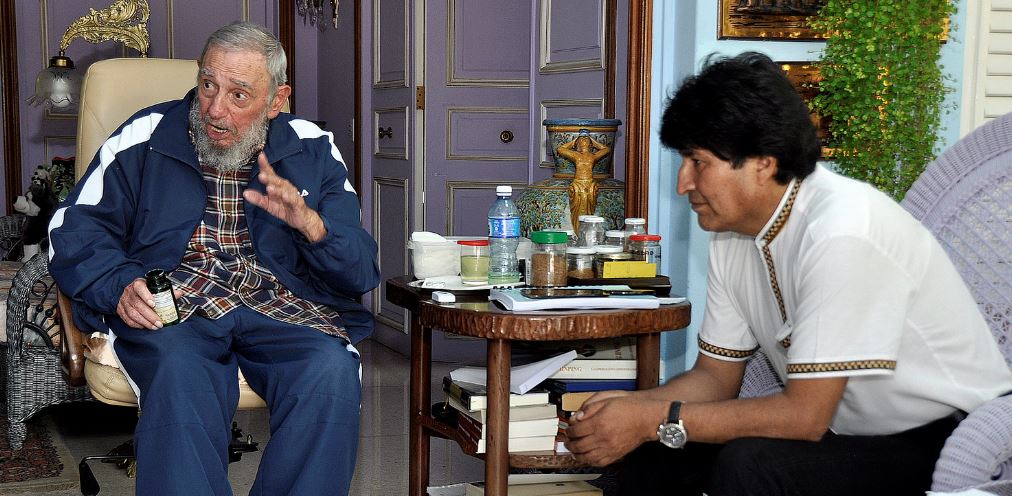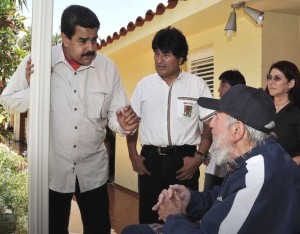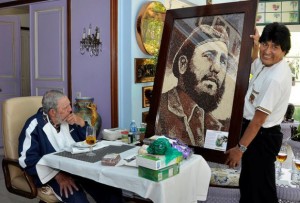
Evo recalls advice from Fidel on waging a peaceful revolution
Back when Evo Morales Ayma was a labor leader in Bolivia running for president, he traveled to Cuba and was introduced to Fidel Castro. He recalls one of his conversations with the Cuban leader in an article published Monday (Aug. 17) in the Argentine newspaper Página 12.
“In 2004 or 2005 […] when I went to Cuba as a guest, I spoke to leaders of the Communist Party, talked to the authorities and asked them what I should do if some fine day I became an anti-imperialist president and the United States blockaded me like it did Cuba,” Morales told a reporter from Página 12 in an interview conducted in La Paz.
“All the comrades I spoke with — except Fidel — told me that the United States is vengeful and rancorous. When I finally spoke with Fidel, he gave me a totally different answer. ‘Evo, first of all, Bolivia is not an island like Cuba.

“‘Bolivia has Lula, Cheavez, Kirchner and us,'” Fidel told Morales, referring to Brazilian President Lula da Silva, Venezuelan President Hugo Chávez, Argentine President Néstor Kirchner, and the Cuban people.
“‘There’s no need for fear. Bolivia has so many natural resources.’ I asked him what I should do to lead a revolution in Bolivia. I expected that he’d say that I had to fight with weapons, but all night long he spoke to me of health care, education and government responsibility.”
Following that populist advice, Morales went on to win the presidential election in 2005; last October, he was re-elected to a third term. Last week, he and President Nicolás Maduro of Venezuela flew to Havana to congratulate Fidel on his 89th birthday and visited him Thursday (Aug. 13) at his home.
In the Página 12 interview, the 56-year-old Bolivian leader touches on various aspects of geopolitics. He repeatedly refers to the United States as “the Empire.”
“Especially in South America, the countries are anti-imperialistic,” he says. “The Empire divides them, to try to defeat the progressive governments. History repeats itself but the people will always support and ratify the government that backed them and liberated them. That’s been our experience.
“We are concerned by the case of Venezuela, above all by the economic problems. The Bolivarian and revolutionary position is firm, despite the political and economic aggressions or the Parliamentary aggressions, as in Brazil.
“These are not the times of empires but of peoples. We are not in times of oligarchy but of social movements.
“There is an offensive against the countries with anti-imperialist governments. Nowadays, they can’t stage military and civilian coups d’état or conspiracies from the Empire, but I feel that there are other forms of political aggression, such as the blackmail and the conditions pressed on Venezuela.

“The vulture funds in Argentina — that’s an economic aggression. When an anti-imperialist government is solid, they want to destroy it from the economic side. But the conjoined work of the region is important. And when they’re frustrated militarily or economically, they stage a political coup, as they did against [Fernando] Lugo in Paraguay [in 2012.]
“I feel that the aggression against [Brazilian President] Dilma [Rousseff] is political, a blow through Congress. […] I feel that the Empire wants to take away the Workers’ Party’s political patrimony. It’s not just against Dilma, it’s also against Lula, using the argument of corruption.”
Evo Morales could never be charged with corruption or nepotism, the Bolivian president says.
“Nobody messes with [my administration], neither my sister nor my brother,” he says, adamantly. “If I do something wrong, it’s my responsibility. My family won’t be bespattered.
“The domestic and foreign opposition use what little they can find to erode us — corruption, human rights, the economy. If some right-wing government were involved in corruption, the United States would be bailing it out, preferentially.”
Washington is involved in the attempts to destabilize progressive countries, Morales believes. “That’s very clear in the case of Venezuela. And the vulture funds — where do they come from? The vulture funds use their economic structures in the United States to blackmail us.”
Asked about the chances that Bolivia will be admitted to Mercosur, Morales answers that “Mercosur is an economic and commercial space. I know that Brazil and Argentina will never abandon us, so that we may continue to liberate ourselves economically.”
[To read the entire interview, in Spanish, click here.]

